About Our Program
The UCSF program has a long history of producing leaders in academic medicine, public health, and clinical practice. The program provides all trainees with a broad mastery of the knowledge, skills, and attitudes needed to be an outstanding general internist.
Beyond these competencies, trainees are encouraged to individualize their pathways during residency so that they can pursue customized educational opportunities that will allow them to enter the next phase of their careers. This also allows residents to smaller communities and educational tracks within the large program to maximize the time spent with residents and expert faculty who share similar interests. We want our housestaff to be outstanding clinicians, teachers, and leaders exceling in their other academic interests during residency.
Our program by the numbers:

former Resident and Chief Resident
185+
RESIDENTS
3
HOSPITAL SYSTEMs
7
PATHWAYS
10
AMBULATORY SITES
PGY1 YEAR
The PGY1 year is generally the same for all interns in all tracks except for the content of the block rotations.
| Outpatient Medicine | 8 weeks |
| General Medicine Wards (ZSFG, UCSF Health, VA) | 16-24 weeks |
| ICU (ZSFG, UCSF Health) | 2-6 weeks |
| Cardiology (ZSFG, UCSF Health) | 4-8 weeks |
| Liver Transplant Unit (UCSF Health) | 0-4 weeks |
| Emergency Department (UCSF Health) | 3 weeks |
| Night Float | 2-6 weeks |
| Procedures/Quality/Jeopardy | 4 weeks |
| Vacation | 3 weeks. All interns have an additional six days off during the holidays (December/January). |
PGY2 AND PGY3 YEARS
During the PGY2 and PGY3 years, all residents alternate every other rotation between an inpatient experience and an ambulatory/elective/research experience.
The inpatient experiences are tailored into 4 different curricular pathways, Inpatient Threads. The goal of Inpatient Threads is to create a “prix-fixe” menu of R2/R3 inpatient rotations that align clinical curriculum with resident career goals. With this method, we individualize training pathways and thoughtfully improve progression and balance of rotations, simplify scheduling, and create equitable schedules for residents that are customized to career goals.
The General Categorical Thread is the standard categorical resident pathway, helpful for future internists, hospitalists, non-procedural subspecialists (rheumatology, endocrinology, hematology-oncology, etc.). It is a balanced well-rounded experience including:
-
4.5 blocks of wards
-
2 blocks of ICU
-
2.5 blocks of Cardiology
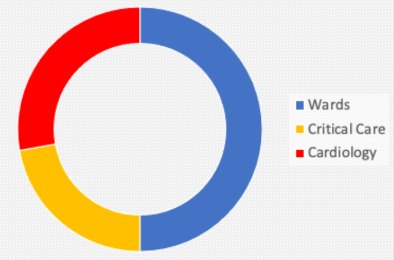
The Critical Care & Cardiology Thread is designed for future cardiologists, intensivists, and procedural subspecialists. This will include:
-
3.5 blocks of wards
-
3 blocks of ICU
-
3 blocks of Cardiology
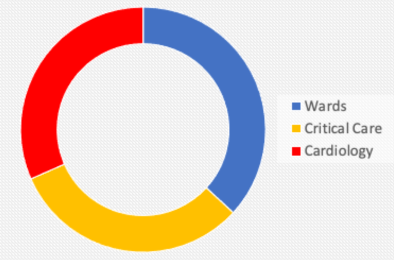
The Primary Care Thread is automatic for SFPC and UCPC residents, designed for future primary care physicians. This will include:
-
5 blocks of wards
-
1.5 blocks of ICU
-
1 block of Cardiology
-
1 additional Ambulatory block
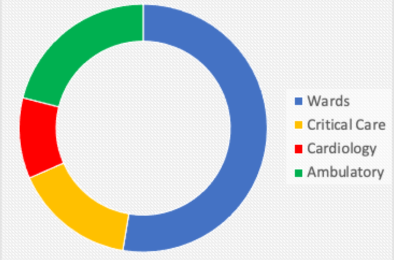
All residents in all Threads will have equitable amounts of Float and Jeopardy.
The Block experiences are designed to seamlessly integrate primary care learning into the residency curriculum and allow residents to explore subspecialty topics and engage in individualized education. Block time consists of two to four-week-long rotations that alternate with inpatient rotations over an academic year. Each resident is assigned approximately 16 weeks of Outpatient Block rotations and six weeks of Elective rotations per year.
Outpatient Block (each rotation spans 2-4 weeks):
-
Continuity clinics (3x per week)
-
Longitudinal subspecialty clinics (2x per week)
-
Panel management & scholarly time
-
Pathway and Core Block Curriculum (CBC) didactics
Elective Block (each rotation spans 2 weeks):
-
Continuity clinics (2x per week)
-
Subspeciality elective experiences (inpatient and outpatient options)
-
Non-clinical elective experiences (research, wellbeing, DEI, etc)
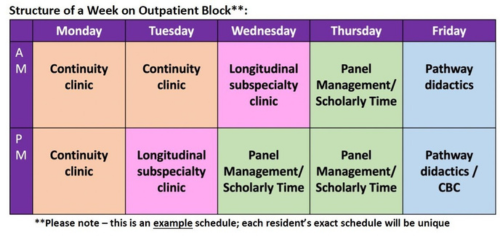
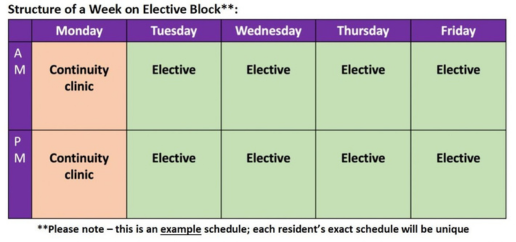
All R2s and R3s will receive 4 weeks vacation which are scheduled during Block time. All residents have an additional six days off during the holidays (December/January).
EDUCATION
Resident Report: Residents' Report occurs across all 3 training sites (including a virtual cross-site Ambulatory Medicine Report once a week). All residents' report conferences are in-person at each site, with the exception of the cross-site once a week ambulatory report. These conferences are chief resident run and all are welcome to attend, including students, trainees, and faculty. The focus is on clinical reasoning where we all learn approaches to patients together.
Intern Report: Once a week, there is a dedicated interns' report, run in the style of the daily Residents' Report. Interns have protected educational time with pager coverage during this conference.
Noon Conferences: Content of the daily noon conference ranges from subspecialists' and generalist didactics regarding their fields to the famous quiz game "Championship of the World". Additionally, there is a Morbidity and Mortality conference and a Medical Grand Rounds weekly at each of the training sites. Conferences emphasize content that prepares residents for success on their Internal Medicine board certification exam.
Curricular Half Days
The structure of the day for residents is arranged so that they can consistently attend educational activities. Major portions of the curriculum have been structured deliberately to create dedicated teaching "half days" for both interns and residents with protected time for education. These curricular half days have allowed us to further focus material to the various levels of training.
- Intern Half Day (IHD)
Interns attend a monthly half day (Wednesday afternoons) during which they receive four uninterrupted hours of a core curriculum while the residents and faculty cover the interns' inpatient responsibilities. The topics are high-yield and practical and include small group workshops and simulation training. - Core Ambulatory (Block) Conference Series (CBC) During their block months, PGY2s and PGY3s participate in a core ambulatory conference series every other Friday afternoon (the alternating Friday afternoons are filled with - Track or Pathway-specific didactics or panel management / admin time). This curriculum focuses on important aspects of ambulatory medicine, including primary care, preventive medicine, chronic disease management, and urgent care. Didactics in clinical epidemiology and critical review of the literature (a.k.a. "journal clubs”) have been embedded into the curriculum.
- Track-Specific Didactics
Each track has bimonthly teaching sessions specifically designed to address the interests of that group.- ZSFG Primary Care Didactics: In addition to weekly pre-clinic conferences, SFPC residents have core didactics on Thursday and Friday mornings during their block months. These seminars focus on common outpatient problems, quality improvement, behavioral medicine, and social medicine topics. Residents also participate in journal club and have a facilitated support group during those times.
- UC Primary Care Didactics: UC Primary Care residents attend various dedicated didactics during their block time. These didactics include a Behavioral Medicine seminar focused on doctor-patient communication and a Primary Care Systems and Quality Patient Care Conference focused on caring for the chronically ill as well as utilizing systems to optimize delivery of care. UC Primary Care residents also participate in a Core Seminar series focused on ambulatory clinical topics.
Pathways-Specific Didactics. During the outpatient/elective months of the R2 and R3 years, residents have dedicated time for didactics in their Pathways.
Journal Clubs: There are a total of 3 journal clubs in each block and residents will have the opportunity to facilitate 1-2 journal clubs in the PGY2 and PGY3 year. Two of these journal clubs are during the core seminar series and one is in the evening. The purpose of the evening journal club is to bring together all core categorical residents in a more relaxed setting, enjoying dinner at a colleague's house while discussing the literature. PRIME, UCPC, SFPC also have designated times for their track-specific journal clubs, to which all residents are invited.
R1 Leadership Launch: We recognize that the transition from intern to R2 can feel more intimidating than the step from medical student to intern. In the spring of intern year, all the interns spend a day reflecting on their year and planning for the R2 year. Large and small group sessions are designed to cover team management and leadership skills, tips at incorporating teaching into the daily routine, how to thrive in ambulatory clinic as an R2, and keys to self-care and well-being. A happy hour follows.
R2 Retreat: In the spring, all R2s spend a half-day reflecting on the year and on the upcoming role as R3s. Large and small group sessions focus on advanced leadership skills, effective feedback, and other teaching skills. A happy hour follows.
CLINICAL WORK HOURS
Our inpatient rotations are 28 days long with 5 days off per 28 days.
The UCSF Internal Medicine residency is dedicated to providing high-quality and safe patient care and maximizing continuity while ensuring housestaff quality of life. With extensive resident, chief resident, and faculty input, we designed inpatient rotations which comply with the new 2017 ACGME Clinical Work Hours Guidelines and which maintain our core values of patient-centered care, teamwork, teaching and intellectual curiosity. At all 3 sites there are non-resident (hospitalist) services which have helped achieve compliance. We are committed to not compromising the overall educational mission of the program. With ongoing housestaff, chief resident, and faculty input, we continue to make adjustments to individual rotations as needed.
RESEARCH OPPORTUNITIES
Our program encourages residents to engage in a research or scholarly activity during residency. To facilitate this activity, categorical residents may dedicate up to 3 months for research over the last 2 years of residency. PRIME residents may take up to three months (while still attending scheduled didactics) and have half to one day per week during ambulatory block months. Residents in the UCPC program have a half day per week during ambulatory blocks and may take an additional 1 month during the last 2 years of training. SFPC residents have 2-3 half days per week during ambulatory blocks and may take an additional one month as well.


At national conferences throughout the year and at the annual UCSF Floyd Rector Resident Research Symposium, residents are given a chance to present their projects. To view the 2025 Floyd Rector Resident Research Symposium Submissions, click here.
QUALITY AND PATIENT SAFETY
UCSF commits to teaching our trainees the fundamentals of quality improvement and patient safety, preparing them to meet the needs of ever-changing healthcare systems and increasingly complex systems. Our three year curriculum begins with a dedicated Procedures/Quality/Jeopardy (PQJ) rotation with hands-on patient safety case reviews. In 2nd and 3rd years, residents complete longitudinal clinic-based quality improvement projects and focus on the population health of their outpatient panels. Throughout all years of training and at all sites, residents participate in M&Ms that focus on patient safety events and providing high value, high quality care.
We also have a unique program of housestaff improvement projects across multiple hospital sites, providing all residents a chance to earn cash incentives to improve quality measures. These housestaff improvement projects are resident led, providing a chance for interested 2nd and 3rd year residents to design and lead QI projects. Prior projects have covered reducing mean time to admit in the ED, increasing rates of hepatitis C screening in vulnerable patients, and prescribe naxloxone to at-risk patients.
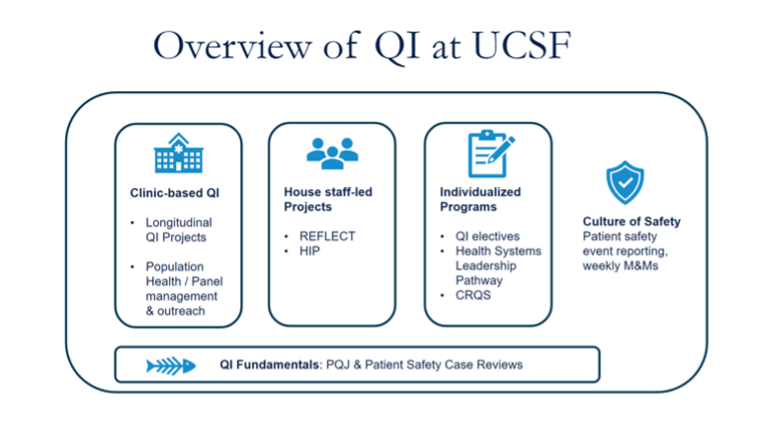
Rural and Global Health Electives
Rural and Global Health Electives: As we recover from the COVID pandemic, we are reconnecting with our global health partners and hope to have a few new sites on-line in the next year. For now, our residents can rotate at rural VA sites in Clearlake and Eureka, California, at Indian Health Service sites in Shiprock and Gallup, and in Hanoi, Vietnam and Saipan. Resident salary and benefits are paid during these away electives. Housing at the VA and the Indian Health Services sites is covered.